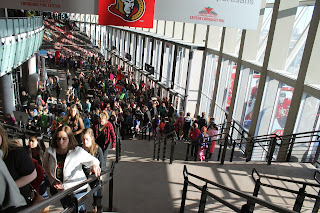The Leadership Club earned spots at this year's National We Day, which was held at the Canadian Tire Centre. The event hosted 16 000 students and teachers who have worked to make a difference locally and globally. It was our first time attending the National We Day, and we certainly hope to be invited again in the future!
It was a really special, emotional, engaging and energizing day for students, staff and parent volunteers alike. We got to hear from Queen Noor of Jordan, MLK Jr's son, Spencer West (a legless adventurer) many youth who have worked with Free the Children, several musicians and other inspiring speakers and entertainers.
We all got "Swag Bags" that included awesome light bracelets that lit up when we clapped.
I am so proud of the Leadership Club members for earning their way to the event and for their awesome behaviour the whole day. Our goal was to arrive laden down with food, and some students even had to replace their bags, as they brought so much!
We wish that all members of the Leadership Club could have joined us, as they've all worked really hard this year!
Thanks to the staff and parent volunteers for joining us today!
At the end of the day, some students listed their favourite things about the day. I'll let them tell you the story:
"It was really sad to hear about lots of children not being able to have food, or being abused. I'm inspired to change the world." - Erika
"I liked Jen and Jas. Their voices were nice." - Ben
"I liked the Queen, Spencer West and the girl with HIV. Her speech helped me because I have Diabetes, and I realized that everyone has something. Spencer overcame obstacles and he's inspiring." - Katie
"I really liked how the kids talked about a boy who changed the world (Iqbal) and a girl who changed the world (Malala). I really liked what the Queen of Jordan said. I think we should work with Free the Children next year." - Gabby
"Something that really stuck with me was when the man talked about walking across Canada and enjoying nature's beauty. I want to fundraise to help people enjoy nature. I also liked the Queen of Jordan. When she was talking, I was really focused. It was inspiring. She said some things that were sad, but also hopeful." - Vickie
"I liked everyting, but mostly I liked the girl with HIV because she stood up for herself. It was really powerful that they thought she was going to die and now she's a teenager. When the children spoke, they had a lot of emotion and power." - Millie
"The girl who talked about her life with HIV and her brothers and sisters said that there are so many wheelchairs and crutches, words can't get through to us." - Madi
"I liked the girl with HIV's speech. She was really inspirational and very determined." - J
"I really liked the girl who was HIV+. She was really inspiring and she had a lot to say about bullying. It was very helpful and her message could be helpful to many more people." - Fiona
"I liked it all!" - Mel
"I really liked Spencer, because it's amazing he accomplished so much." - Anna
"My favourite moments were when Spencer walked our on stage and when Jordan sang 'Freedom' because it was his first time singing that song. I cried." - Hannah
"I liked when Queen Noor talked about how many kids are in poverty and when Spencer said, 'Find your why'." - Clara
"I loved the lights. Whenever somebody would clap, or when someone said something that really meant something to you, you could see all the lights sparkle." - Laryssa
"I liked everything!" - Molly
"My favourite part was everything!" - Pat
"I really liked the HIV+ girl. She was very open to showing that everyone has a staircase. When you get to the top, you're done and you've reached your goals. She has a couple of extra steps and she embraced that." - Sharky























